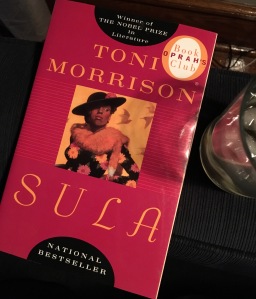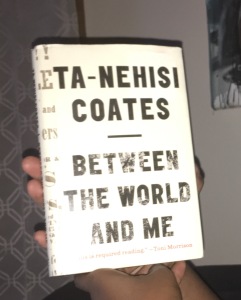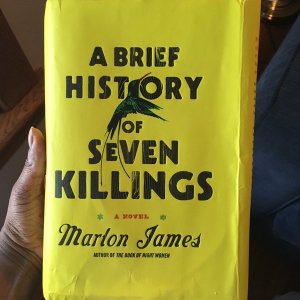He walked into the building and arrested everyone. He wore what appeared to be a mask covering his nose and mouth; it was not clear if he was there to rob the place, or if there was just another outbreak; or, if it was merely the coincidence of his dark skin pressed against his darkened features that shrouded his broad nose and his dark, plum lips causing them to disappear into his cheeks and his chin. Whatever was the case, whether he wore a mask or not, he was, indeed, there to rob the place.
He had become arrogant, even audacious. But, he wasn’t careless or reckless; it’s just that he just didn’t care about precision; of crafting the perfect plan, not to mention the perfect escape, because he knew, whatever that was going to mean, they could never catch him. Let them come; he would wait for them. He was well aware of the feeling of metal entering into the body hot, and staying there; or, leaving. He knew entrance and exit points in himself and in others—and had been the cause of both. He sat with his back against the wall and waited for them to come, and only stood up when they entered into the building and recognized him with a point and a glare and gave chase to try to capture him. Running, running, running the speed and danger of his flesh.
Quick feet press and break the ground, concrete to asphalt to rubble, to dirt broken open to carry his body into the air to float, crumbling earth, asphalt, concrete, grass, turf, motorcycling legs beneath upended by the supernatural: blackened mask and features became glossy raven, wearing feathery just beneath an extended mandible. The officers and the patrons ran out to catch only a glimpse. A fluttering up into the air, and the cascading fall of small plumage calmly, circularly landing on their shoulders. Haloed by the sun just above their head, the black thing appeared holy, right before it disappeared into the glint and din of the towering, mirrored buildings.
* *
He had walked into the store to pick up exactly three things. Juice. Coffee. And, boxed cake. The pandemic was now two weeks in, and things were pushing their way off of the shelves. But, he wasn’t there to join to fracas; just to pick up a few luxury items for the virtual brunch later in the day for his wife’s centennial celebration of her alma Mata. A hundred years. Generation upon generation, recently removed from slavery, they had built the school for colored girls—those whose fathers could not be named, but whose mothers had ensured them a future. And, it was simple: walk into the store; down the aisles; select the specific three items and leave, unnoticed. With one simple rule: don’t attract attention.
It couldn’t have been any simpler: they had already ordered their essential wartime munitions—water, toilet paper, paper towels, soap, frozen and canned goods—online. He would be invisible, move through the building undetected, slide his card into the machine, and disappear as anonymously as he had entered. They had mapped out his entrance and his exit, and his escape, if necessary. Park exactly one hundred yards from the left most entrance; get a handheld cart only, never a bascart; wear agreeable colors—turquoise or fuchsia, but never black or brown; no deviation from the three items; and, lastly, walk in straight lines, never zig-zag—the store had been pre-mapped, and his direction clearly laid out: aisle three for the coffee (if he couldn’t find Kenyan whole bean, Ethiopian would serve as a solid second; and, if those failed, and only if those failed, Folgers or whatever he could grab. He wasn’t to stand in one place more than exactly one minute, timed to the buzzing on his digital wristwatch), aisle eight for the boxed cake (whatever he saw at eye-level; he was under no circumstance, no matter how grand the Dutch chocolate or the Windsor Torte looked, to stretch his arms over his head, or to bend at the waist; if he could not reach forward, he was to leave it); and, aisle fifteen for the juice (preferably orange, the pulp to liquid ratio was irrelevant, whatever shelf was least populated would be selected—he could not run the risk of a full shelf; of pulling 64 fluid ounces a-loose, and having the small backfire/snap back sound of plastic adjusting for a recently released, too tight squeeze of a container). He was, under no condition, though, to backtrack for a forgotten item. If he missed aisle three, they just wouldn’t have coffee; or, if he somehow missed aisle eight or fifteen, she would understand what stress can do to memory—no sense being a hero for a caffeine or sugar rush.
He knew the layout: two entry doors, two exit doors (each would open in the opposite direction, but that would only spook the customers and draw unnecessary attention to himself); five cameras, and two uniformed guards. It was supposed to be a routine visit; it wasn’t supposed to include helicopters or sirens; or, the crack-whip sound of misidentification and misunderstanding. “You’re innocent; you haven’t done anything wrong. I love you,”—this was the last thing his wife told him as he was pulling/backing out of the driveway. He hadn’t forgotten any of the rules; hadn’t deviated from the plan, was there to purchase exactly three items. But he was navigating the pandemonium of black flesh and ended up robbing the place.
* *
He parked exactly one hundred yards from the left-most door. He and his wife had measured the distance themselves during their dry run the night before. He had picked up a handcart and had remembered the perfect posture—back erect, eyes straight ahead, slight bend at the knee. He was making his way to aisle seven, and had made it safely there. He selected the Kenyan roast, whole bean, placed it in his cart, stood up—not too quickly, but the adequate speed, a slow and deliberate ascent—made an about face to go back down the aisle; he turned left at the endcap and walk approximately one hundred feet to aisle eight when it happened. He had been spotted. Before he entered the aisle and could select the boxed cake: “Excuse me. You; yes, you.” This how it began and ended.
He always knew he could become what he needed to be. His wife had always hoped that he could just color himself the shade of whatever background he was in; they had rehearsed it, and had been ready for what would happen to them under these conditions when the pandemic broke out and everyone began to obsessively hoard, and had decided this was the best strategy.
He had simply eschewed what they had decided upon. He had decided, in this moment, to abandon it all. The strategy for safety; the resurrection of organized and disciplined principles—never engage, always stare ahead, avoid conflict; there were ten steps to practice for shopping as there were for sitting at lunch counters to order a soda (any brand), a hamburger and French fries. No matter what is said, never stop, pick up exactly what you have preordained in the list. Execute, execute, execute. But something changed, “You heard me, I know it. What are you doing here? Hey, you.” Radio silence, then. “We’re gonna need back-up.” And, the plan was deviated; the order broken, he turned around, backtracked like he had a change of heart—not of his selection of the Kenyan blend: “I might try Ethiopian or maybe Columbian instead”—and it was decided in that moment that he was, in fact, there to rob the place. Routine and planned became spontaneous at the flash and speed of a man once invisible, now turned hybrid: half-man, half-illusion. But, in this moment, he also knew he would never be caught, octopus disguised as cuddle fish suddenly unhidden shifting shape into lion fish, moving his arms to make what was a purchase look like an obscene gesture of concealment.
It is never really clear when a shapeshifter changes form if it is for protection or predation. He had felt in himself a changing, a subtle and uncontrollable shifting and knew he could not control the outcome. He could no longer hide himself, and knew, in that moment, he no longer wanted to. It is said that when they dream, octopus change colors and can even look like they are wearing masks, can change the texture of their skin to look ragged and pointed, or soft and light; even dark and ominous depending on what they are dreaming about, and in/for black men it is no different.

 Several quotes from Sula remained with me in the 15 years since I’ve read the novel. Fifteen years have passed and I, an older and (hopefully) wiser woman, now understand the meaning of these quotes more deeply. I understand that Sula is inherently about life, love, choice and perspective. As I approach my 32nd birthday, I realize that this novel deserves revisiting, in order to better appreciate these themes.
Several quotes from Sula remained with me in the 15 years since I’ve read the novel. Fifteen years have passed and I, an older and (hopefully) wiser woman, now understand the meaning of these quotes more deeply. I understand that Sula is inherently about life, love, choice and perspective. As I approach my 32nd birthday, I realize that this novel deserves revisiting, in order to better appreciate these themes. Between the World and Me is Ta-Nehisi Coate’s visceral and highly introspective account of what it means to be a black man in America. To Coate’s (and perhaps the millions who identify with this work, myself included), to be black in America means that your body is disposable. Cheap. Ripe for plunder. Between the World and Me is Coate’s first hand account of the historic and current violence against black men perpetrated by figures of authority in America. In this text, he forces America to take a long hard look at itself through a dirty mirror. And it hurts.
Between the World and Me is Ta-Nehisi Coate’s visceral and highly introspective account of what it means to be a black man in America. To Coate’s (and perhaps the millions who identify with this work, myself included), to be black in America means that your body is disposable. Cheap. Ripe for plunder. Between the World and Me is Coate’s first hand account of the historic and current violence against black men perpetrated by figures of authority in America. In this text, he forces America to take a long hard look at itself through a dirty mirror. And it hurts. I started reading Marlon James’ epic novel A Brief History of Seven Killings in May 2015 and did not finish until January 2016.
I started reading Marlon James’ epic novel A Brief History of Seven Killings in May 2015 and did not finish until January 2016.